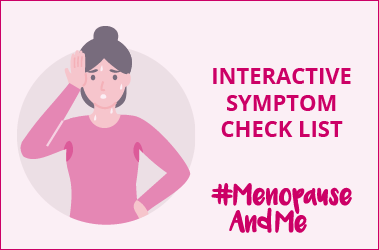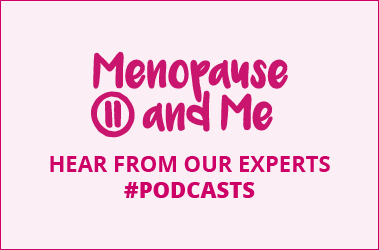
Menopause
The menopause is when a woman stops having her period and her ovaries lose their reproductive function.
Call it what you will – ‘the change’, ’that time in her life’ – it is something that all women go through. Menopause usually occurs between the ages of 45–55, in the UK the average age is 51. In a small number of cases, some women become menopausal in their early 40s or even younger. See Early Menopause
You may which to use our Menopause Symptom Checklist to help your discussion with your healthcare professional
WHAT CAUSES THE MENOPAUSE?
The menopause is influenced by a change in hormone levels. When a woman is fertile, her ovaries produce hormones called oestrogen and progesterone in response to other hormones (follicle stimulating hormone (FSH), and luteinising hormone (LH)).
All these hormones interact as part of the monthly menstrual cycle, which results in the development of an egg in one of the ovaries.
As a woman gets older, her store of eggs in her ovaries decreases, as does her ability to conceive. Less and less oestrogen is produced, causing the body to behave differently. The body does not stop producing oestrogen overnight, and the process can take several years. This change is called the peri-menopause.
WHAT ARE THE SIGNS AND SYMPTOMS OF THE MENOPAUSE?
For all women the menopause is an individual experience. For some women, the loss of reproductive ability may be deeply upsetting.
The decrease of oestrogen is often the cause of a variety of symptoms, which may be distressing and may require medical attention. Oestrogen deficiency can affect many parts of the body (causing physical changes) and the brain (causing changes in emotional well-being), and the skin (causing changes in its elasticity and thickness).
For 10% of women, symptoms can continue for up to 12 years.
8 out of 10 women experience some menopausal symptoms. For about half of women, menopause symptoms will typically last for about seven years after their last period.
Symptoms may include:
-
Hot flushes (also known as hot flashes)
-
Night sweats
-
Low mood
-
Low energy levels
-
Mood changes
-
Irritated skin
-
Sleeplessness or insomnia
-
Vaginal dryness
-
Reduced interest in sex
-
Joint stiffness, aches, pains & reduced muscle mass
-
Problems with memory and concentration
-
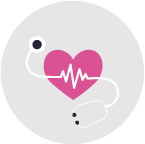 Palpitations
Palpitations -
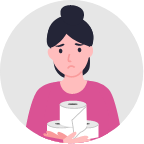 Increase urinary frequency, urinary incontinence & urinary tract infections
Increase urinary frequency, urinary incontinence & urinary tract infections
Every woman is an individual and symptoms can vary hugely in duration and severity.
Once the ovaries have ceased their production of oestrogen, other changes may take place, which can have an effect on long-term health. This includes changes that affect the strength and density of bones increasing the risk of osteoporosis (bone-thinning disease).
WHAT TREATMENTS ARE RECOMMENDED?
Hormone replacement therapy (HRT) is the most effective and widely used treatment for menopausal symptoms. As the name suggests, it's a way of replacing the hormone oestrogen that is lost during the menopause.
HRT aims to relieve the symptoms caused by oestrogen deficiency. Your healthcare professional will discuss with you the benefits and risks of HRT and other treatments. The management of your menopause should be tailored to you.
Not all women can take HRT. There are other treatments that can help for women where HRT is unsuitable, or if they do not want to take HRT. These can include both treatments that are prescribed and complementary or alternative therapies.
CBT (cognitive behavioral therapy) may also be considered to alleviate low mood or anxiety that arise as a result of the menopause.
For those wishing to try complementary therapies, the quality, purity and constituents of some of these products is still unknown and should be discussed with a health care professional.
You should also establish a healthy lifestyle, which includes activities such as regular weight-bearing exercise, a healthy diet, and stopping smoking.
Attend your regular mammography and blood tests, which will screen for diabetes and high cholesterol.
Your health is your responsibility and you are in charge of your own well-being!
If you feel you are struggling with any aspect of your menopause journey, fill out My symptom checklist and ask your GP for advice and help. You are not alone. Whatever the symptoms, help is available for you.
Please select where you believe you are on your menopause journey
Early Menopause
Peri menopause
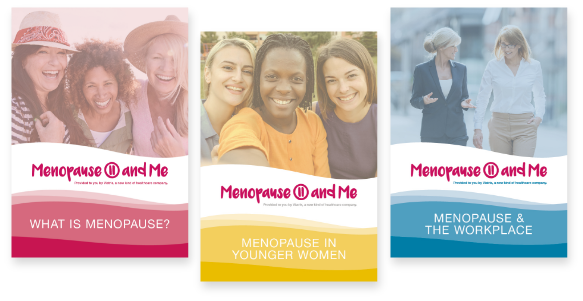
Want to know more about the menopause?
Request a free copy of our guidebooks
WHAT IS MENOPAUSE?
MENOPAUSE IN YOUNGER WOMEN
MENOPAUSE & THE WORKPLACE
Request hereRecommended for you
Job Code: NON-2022-0111
Date of preparation: February 2022


















